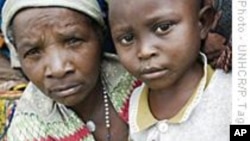The U.N. refugee agency is warning a group of more than 2,000 Congolese
refugees in Burundi not to return to the homes they fled in eastern
Democratic Republic of Congo. The UNHCR says the situation in South
Kivu province is still too volatile and dangerous.
The
U.N. refugee agency says its efforts to dissuade 2,300 Congolese
refugees in central Burundi not to return to the troubled South Kivu
province in the Democratic Republic of Congo apparently are not working.
The refugees, who have been living in Gihinga camp in Mwaro
province since 2004, say they will go ahead with a plan to return.
UNHCR spokesman, Andrej Mahecic, says the agency cannot prevent them from going back. It is a question of free will.
"If
they have decided to return, they are doing it on their own
responsibility. We have certainly been informing them for months that
the situation in eastern DRC in the South Kivu province is not
conducive for returns because of the fighting that is going on there
and that situation is still very dangerous and risky," Mahecic said.
He says the dangerous and abusive conditions that forced the refugees into exile in June 2004 have not changed.
The
Congolese refugees originate mainly from the DRC's Uvira region
bordering Burundi. Earlier this year, the Burundi government and UNHCR
decided to consolidate camps and transfer the refugees to Bwagizira
camp.
Mahecic says only 264 refugees agreed to go. The rest refused to be relocated there.
"The
others said they feared for their safety in the new camp because of its
proximity to what they claim is a rival Congolese community in
Tanzania. Despite UNHCR assurances that the camp was at a safe
distance of 60 kilometers from the border and already hosting Congolese
refugees of the same ethnic group, the refugees said they preferred to
return to South Kivu and informed local Burundian authorities of their
planned departure this week," Mahecic said.
He says the UNHCR supports repatriation as a preferred solution for any
refugee, but he says conditions for organized voluntary repatriation to
eastern DRC do not exist right now.
Mahecic adds
the UNHCR was forced to suspend the repatriation operation to eastern
DRC earlier this year because of the ongoing military operations. The
agency currently cares for some 30,000 mostly Congolese refugees living
in three refugee camps and in urban areas in Burundi.
News
UNHCR Warns Congolese Refugees Not to Go Home

<!-- IMAGE -->